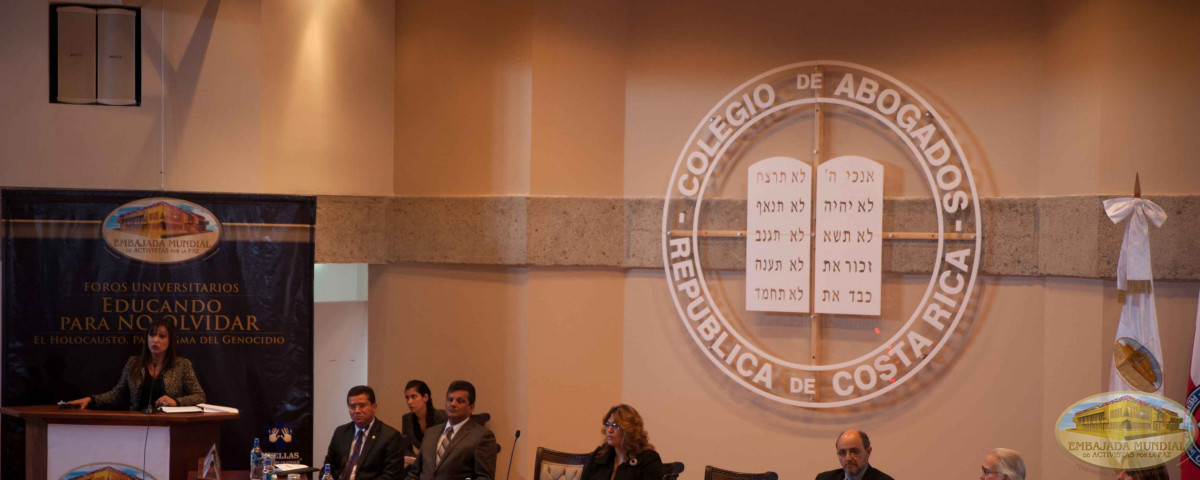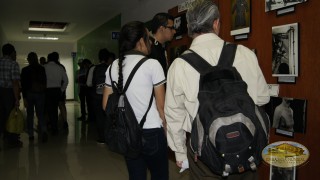Opening of University Forums “Educating to Remember” in Costa Rica
Costa Rica
San Jose, Costa Rica, January 23
At the Costa Rican Bar Association, the Global Embassy of Activists for Peace began the cycle of University Forums “Educating to Remember - The Holocaust, paradigm of genocide”; educational activities that are being carried out in different countries of Latin America.
The call brought together government authorities, experts in the field of genocide, lawyers, ambassadors and students.
Inauguration
As part of the opening ceremony, Rocío Leyva Torres, Vice President of the Bar Association of Costa Rica, opened the Forum, and in her speech she highlighted the role that Costa Rica has played as a country at the forefront of the effective protection of Human Rights; on the other hand, she said: “Not only I am pleased with the impulse that is given to academic activities and reflection in the country, but it is also a very important issue for the recognition and dissemination of Human Rights, that we have given so much impulse during the last negotiations in the School that I represent. Many scholars and law students have referred to the issue repeatedly, and despite all the differences we can say that there is a premise on which we all agree: Human Rights must be respected.”
In turn, the President of the Legislative Assembly of the Republic of Costa Rica, Luis Fernando Mendoza, pointed out the need to remember the past: “It is an honor to address these words in the framework of this Forum that teaches us to look at the past to build a better future. I want to start my words by quoting the famous phrase of Winston Churchill, who said: ‘Do not leave the past as past, because you will put your future at risk.’”
Among other aspects, he acknowledged the invaluable work carried out by the Global Embassy of Activists for Peace, which, according to him, it allows to go through the pages of history to amend mistakes that have cost humanity blood and tears. “By remembering the past we can correct the errors that allow humanity to grow towards a better tomorrow.”
For his part, Luis Fernando Salazar Alvarado, Vice Minister of Foreign Affairs and Worship of the Republic of Costa Rica, referred to the importance of education in the field of Human Rights, to counteract the negationist currents, or people who minimize the Holocaust or other crimes; for which, he highlighted: “There is, in fact, no antidote; but there are means of prevention. And so far none more effective and impactful than Education. That is why I think the work carried out by the Global Embassy of Activists for Peace and the central topic of this Forum is very important: ‘Educating to Remember.’ Education alone does not say anything, barbarism has never been a monopoly of the barbarians. Immensely educated people, with high levels of formal education, were both victims and executioners in the phenomena of extermination.”
Exhibitions
The exhibitions were given by specialists in the field of Law and Education.
⏤Dr. William Soto. Global Embassy of Activists for Peace⏤
For his part, Dr. Soto focused his conference on the Holocaust as a paradigm of genocide, the universal lessons that this historical fact left to humanity, and the prevailing need to take this issue to schools and universities for the knowledge of present and future generations. He stated: “Intolerance, racism, discrimination, political irrationality, social insensitivity, lack of respect for life and human dignity were factors that led to the crimes of the Nazi regime; and at the moment they are the same elements that are unleashing social problems in our Latin American countries.”
“We all possess a fundamental tool for the prevention of genocide as an international crime: Education focused on human values, on constitutional principles; Education based on respect for differences and the autonomy of peoples; where cultural and religious diversity, as well as the confrontation of dissimilar interests, allow us to harbor the hope of a harmonious and peaceful coexistence.”
“Reason assisted Nelson Mandela when he stated: ‘Education is the most powerful weapon you can use to change the world.”
⏤Dr. Camilo Montoya Specialist in Criminal and Criminological Sciences Universidad Externado de Colombia⏤
“Dogmatic aspects of the crime of genocide” was the developed speech, where Dr. Montoya made an observation to the UN Convention for the Prevention and Punishment of the Crime of Genocide, since that convention refers to genocide from the physical point of view, but leaves out cultural genocide.
He expressed: “Properly speaking of the crime of genocide, like all crimes, it has an objective part, which is what is seen, and a subjective part, which is what is wanted, what is thought, the purpose; some call it: subjective elements in addition to fraud; others, like Dr. Jeannette, call it: a special fraud, a direct intent; but there always has to be malicious behavior, in this case of a crime of this magnitude…”
“Now, that is why it is said that the crime of genocide must also be re-studied and re-thought. The legal purpose of the crime of genocide, rather than the existence of the group, is the integrity of the group. When the international community advances on that point and understands that the crime of genocide not only prohibits the existence of the group but the integrity of it… Like the human being: I not only protect their life, I also protect their physical integrity, their health; and the crime of genocide is committed against the integrity of a group. That is why it has been recognized that part of the group can be a passive subject of this international crime; but the problem is to delimit how large that part of the group has to be, in terms of the general context, what representation that group must have so that we consider that ‘x’ number of victims constitutes a genocide or does not constitute genocide. The advance of jurisprudence in this regard is very important.”
⏤Jeannette Arias Mesa. Head of the Gender Technical Secretariat. Supreme Court of Justice⏤
“The legal criterion of genocide in Costa Rica” was the presentation dictated by Jeannette Arias, who also made a brief recount on the legal trajectory of the genocide and the typical configuration with its elements.
Among other aspects, she stated: “Part of my investigation was carried out with the collaboration of the Chief of the Statistical Department of the Judiciary, where we recorded all the crimes; and in Costa Rica this is the crime of Article 383 of the Penal Code, that of genocide; and not a single case is recorded; the Public Ministry has not even entered as a genocide investigation. Seeing the jurisprudence, which would be the relevant alternative of the Third Chamber of the Supreme Court of Justice, which is the Criminal Chamber, and the Constitutional Chamber, there is no jurisprudence regarding the processing of a case of genocide; but there is a very important jurisprudence of the Constitutional Chamber regarding a mandatory legislative consultation, for the approval of several conventions, among them the Rome Statute, which gives rise to the International Criminal Court, where our Court then, through the Constitutional Court, makes a reference to the crime of genocide.”
⏤Dr. Israel Majchel. Holocaust Survivor⏤
The Holocaust survivor shared his story with the crowd, and urged them to continue developing and supporting activities aimed at countering discrimination.
“This morning, when I was coming to this event, I live in Santana (which, as you well know, is the poor neighbor of the Independent Republic of San Rafael de Escazú), I was thinking: What am I going to say to an audience that is so knowledgeable about Rights, Holocaust, from the human point of view, from the legal point of view; and I decided not to speak directly about the Holocaust, but rather about the underlying cause that leads to the Holocaust, and paraphrasing the last thing that Mr. Camilo Montoya taught us, from Dr. Soto’s phrase: It is better to educate to prevent, than judge.” He expressed.
He concluded his participation by saying: “To conclude, I want to insist that we must fight against discrimination. If we are successful in fighting against discrimination in all aspects that we can mention about it, we will also be successful in preventing the reappearance of a Holocaust.”

